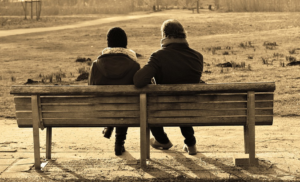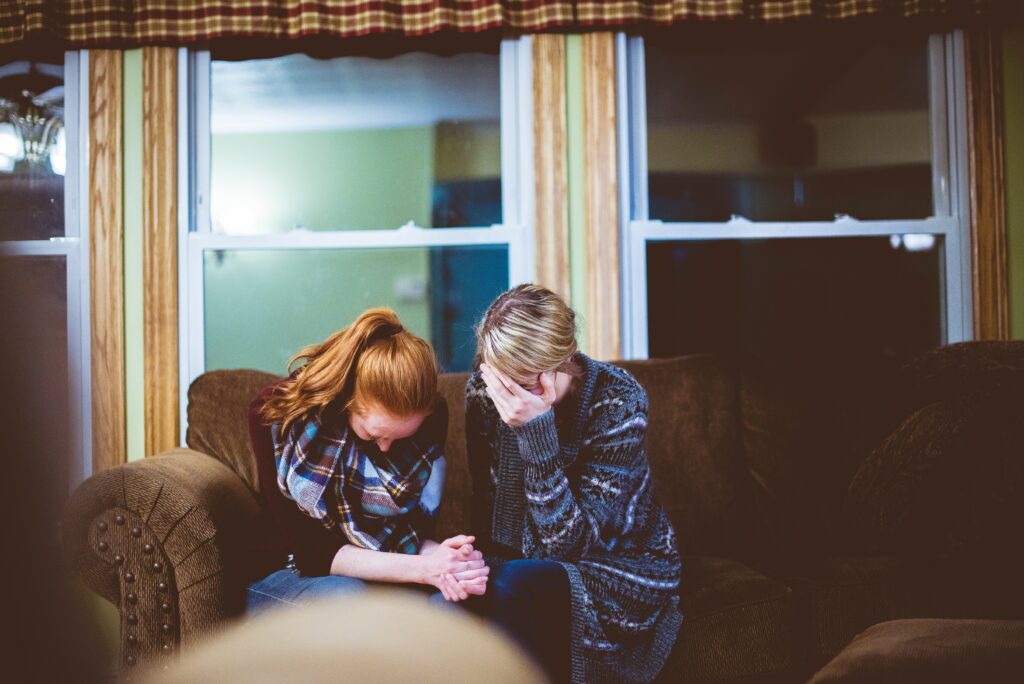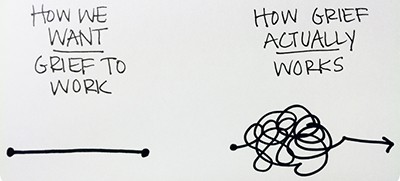Guest blog post by Codie Surratt, LPC, MA. LMT
 Grief sucks. It really does. It’s one of the hardest things I’ve ever experienced. I am equipped with therapeutic tools and years of education. I spent several years working at a center for grief prior to experiencing my own depths of the journey. But learning how to manage grief and loss over time (lots and lots of time), helped me connect with joy on a deeper level, led me to allow more passion in my life, coaxed me into living with purpose, and gave me a new sense of strength.
Grief sucks. It really does. It’s one of the hardest things I’ve ever experienced. I am equipped with therapeutic tools and years of education. I spent several years working at a center for grief prior to experiencing my own depths of the journey. But learning how to manage grief and loss over time (lots and lots of time), helped me connect with joy on a deeper level, led me to allow more passion in my life, coaxed me into living with purpose, and gave me a new sense of strength.
I believe in the resilience and strength of the human spirit, and understanding how we grieve and how to help others on this very personal journey has become one of my greatest missions. I hope some of what I’ve learned will resonate with you or someone you know who is in the depths of their grief journey.
Getting Through Grief And Loss
There’s a quote about grief, well there are millions actually, but this one resonated with me when I was crawling through my own experience.
“In order to get through grief, you must allow yourself to grieve.”
It resonated because all the advice and outpouring of support were no match for what I was experiencing at that time. Nothing seemed to help in that extreme acute stage of loss, except the notion that what I was feeling was OK.
The not knowing was OK. The anger was OK. The deep sense of being stuck in the middle of heartache with no apparent end in sight was OK. The darkness was OK. Grieving, my way, was OK.
In order to know how to get through it – to manage grief and loss – you must grieve.
 And I know what you’re thinking. Getting through it doesn’t even sound possible. It actually feels highly improbable during those early days. Grief doesn’t ever completely dissipate, but it definitely morphs into something different, something tolerable even. However, there is no timeline for when this happens and let me warn you, it’s definitely not linear.
And I know what you’re thinking. Getting through it doesn’t even sound possible. It actually feels highly improbable during those early days. Grief doesn’t ever completely dissipate, but it definitely morphs into something different, something tolerable even. However, there is no timeline for when this happens and let me warn you, it’s definitely not linear.
You can be years removed from a loss, and BAM a song will come on the radio or you’ll see someone that resembles your loved one, or you’ll smell your grandmother’s perfume while walking through the aisles of a grocery store and suddenly you’re back in the middle of that heartache. Know that this is grief, and it’s OK.
Stages Of Grief
If you’re still wondering how to manage grief and loss, it may help to understand grief. And who better than Elizabeth Kubler-Ross, the godmother of understanding grief. She defined and she coined the 5 stages of grief. I believe a few other theorists have added a couple more, but for practical purposes of this blog we’ll go with the five most studied and researched:
– Denial
We don’t want the loss to be real. We may even have that experience where we feel that it was only a dream and we’re going to wake up any moment to reveal this horrible loss never happened.
– Anger
We might get angry with the situation. We might turn our anger towards others when they try to help. We may feel anger at the person for leaving us, or just angry in general. I remember when my father in law died unexpectedly. It was right around the time that Michael Jackson died, and my husband would get so angry at the outpouring of love for Michael’s death. Why do celebrities get so much attention when they die? He was experiencing the anger stage.
– Bargaining
I remember thinking when my cousin, who was more like a brother to me, died from suicide. I kept saying, “If I could just have one more day, I’m certain this wouldn’t have happened.” We bargain with a higher power. We make claims about how perfect or different things will be if they can just bring our loved ones back.
– Depression
This hits hard on many levels. This stage can seem endless. It feels like moving a body part, getting out of bed, or opening the blinds is a challenge. It can feel like hope died with our loved one and that there is absolutely no reason to continue on without them. This stage can be one of the most non-linear, frequent, and seemingly everlasting.
– Acceptance
Many mistake this stage for thinking that it’s OK, that we’re OK. That is not acceptance. Rather, acceptance is accepting reality, not liking it or condoning that it has happened. At this stage, you understand the loss happened and there is no reversing it. This is the reality stage. This is accepting that your loved one is gone.
These are the general stages of grief. It may help to know these. Know that the stages are not linear, but can skip around and circle back. Recognizing these stages exist means many have gone through them; enough so that they have been studied, researched and written about at great lengths. When we suffer from physical illness or trauma, we like to have knowledge of what’s going on in our bodies.
Another Model of Grief
Another model of how to manage grief and loss that can be helpful is William Worden’s 4 Tasks of Grieving.
Task 1: Accepting the reality of the loss. Unlike Kubler-Ross’ model which ends with acceptance, Worden’s model starts with acceptance. His view is that accepting the reality of the loss lays the foundation for grieving. Acceptance may come from viewing your loved one’s body, participating in the funeral, or any number of actions that make the loss real.
Task 2: Processing your grief and pain. This task is not easy, but it is essential. The fastest way through grief is taking the direct path. Some people talk, most people cry, others use art, some join bereavement groups, some channel the pain into creating – the options are endless. The important thing is to mourn, to allow the emotions to come up out of you. It is critical for healing.
Task 3: Adjusting to the world without your loved one in it. This task is about finding a new normal in the different facets of your life. From taking your loved one out of your phone contacts to finding new ways to occupy your time or going to work because of finances, this task shifts you to a new world that doesn’t actively include your loved one. It also means taking on the roles your loved one had or finding ways for others to do those roles.
Task 4: Finding ways to remain connected to the person who died while embarking on your own life. This task balances retaining emotional connection to the person you’ve lost with moving ahead yourself. We can never forget those who greatly impact our lives. This task essentially takes the energy we used to connect with our loved one while they were living and shifts it to remembering and reconnecting with them through memory and concrete ways of memorializing them.
Grief can feel like an illness and some grief can definitely be traumatic, so arming yourself with knowledge about what your mind and spirit are going through may be of some comfort when you’re ready.
Coping With Grief And Loss
There are many ways to cope with grief. The one thing I know for sure regarding grief, though, is there is no right or wrong way to do grief. There is no one-size-fits-all model for coping. That being said, here are a few coping skills that have helped me and many others discover how to manage grief and loss.
1). Community
Isolation can often be our first response to grief. It feels like shutting out the world is the only thing that can help. Fight against isolation when you can. Allow yourself to receive help, to be in the presence of people who love you and may also be grieving with you.
 Having worked for a grief center, I saw some of the most profound healing happen when I facilitated groups for people grieving similar losses. Seek out grief support groups. There are many support groups in the Chicagoland area or you can use this resource to find one closer to home.
Having worked for a grief center, I saw some of the most profound healing happen when I facilitated groups for people grieving similar losses. Seek out grief support groups. There are many support groups in the Chicagoland area or you can use this resource to find one closer to home.
And if you can’t muster the strength to drive yourself there, look online for groups. There are many wonderful Facebook groups dedicated to specific losses and specific populations that are struggling.
Being part of a community is one of the best ways to cope. It helped me to reach out to my family members who were dealing with my cousin’s loss as well. Being around people that you trust with your grief is extremely important and a catalyst for walking through the healing process.
2). Allow
 When we are in pain, struggling, and suffering, we have a natural tendency to want to run from the discomfort. When we are in the grief process, those feelings can be an overwhelming part of this temporary, though not short, new normal. Allow yourself special time to actively lean in to the grief; cry, get angry, feel the hurt, confront the guilt, scream, do whatever it may be. These are all important experiences for moving with and eventually through the pain. When we fight, ignore, or suppress, we simply add to our pain. If you’re afraid that once you start crying you won’t stop, set a timer and give yourself 10 minutes to cry at a time.
When we are in pain, struggling, and suffering, we have a natural tendency to want to run from the discomfort. When we are in the grief process, those feelings can be an overwhelming part of this temporary, though not short, new normal. Allow yourself special time to actively lean in to the grief; cry, get angry, feel the hurt, confront the guilt, scream, do whatever it may be. These are all important experiences for moving with and eventually through the pain. When we fight, ignore, or suppress, we simply add to our pain. If you’re afraid that once you start crying you won’t stop, set a timer and give yourself 10 minutes to cry at a time.
3). Say Their Name
One thing that helped my pain and grief immensely was hearing stories others told about my cousin. It wasn’t easy to say his name in the past tense or talk about him not being here. However, it was part of my healing process, part of my acceptance phase, and part of my allowing. Know that it is OK to laugh, reminisce about, speak of, and keep your loved one close to your heart by speaking about them.
4). Being In Nature
 Light from the sun can actually increase serotonin levels and decrease cortisol. This is science. But what nature can also do, beyond the scientific, is provide us with perspective. When we grieve we often begin searching for existential answers to “why” questions.
Light from the sun can actually increase serotonin levels and decrease cortisol. This is science. But what nature can also do, beyond the scientific, is provide us with perspective. When we grieve we often begin searching for existential answers to “why” questions.
- Why?
- Why am I here?
- Why are they gone?
- Why did this happen?
- How do I go on?
No one can truly and honestly answer these questions for you when you’re grieving. Chances are you usually aren’t interested in the answers anyway. You’re hurting. But nature, the cycle of life, the gentle calm of the trees, the feel of the grass on your feet, the expansive sky overhead, the sun on your face – all those can impart a sense of calm, grounding, and clarity. Take a walk. Sit by a pond. Or simply sit on your patio in the sun. However and whenever you can, be in nature.
You Don’t Have to Grieve Alone
 Again there are no right or wrong ways to grieve. Be gentle with yourself when learning how to manage grief and loss. Know that there are people out there who can help. You do not have to grieve alone. And as a therapist who specializes in grief in our Glen Ellyn office in the Chicago area, my door is always open. I encourage you to seek professional help when the weight feels too heavy, or you simply need to talk. A door will always be open for you.
Again there are no right or wrong ways to grieve. Be gentle with yourself when learning how to manage grief and loss. Know that there are people out there who can help. You do not have to grieve alone. And as a therapist who specializes in grief in our Glen Ellyn office in the Chicago area, my door is always open. I encourage you to seek professional help when the weight feels too heavy, or you simply need to talk. A door will always be open for you.
Guest blog post by Codie Surratt, LPC, MA





